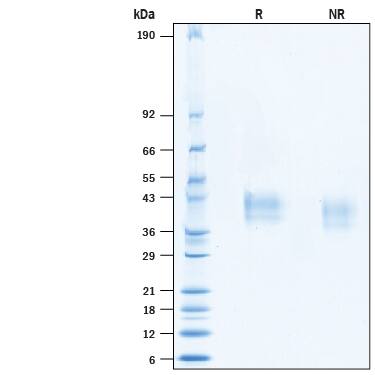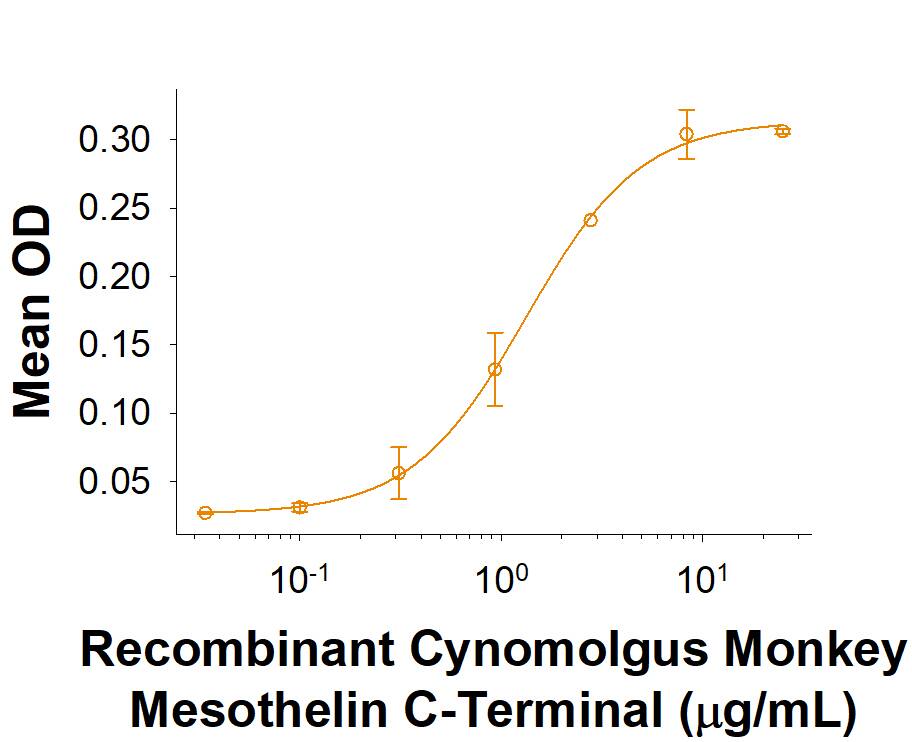Recombinant Cynomolgus Mesothelin (aa417-693) His Protein CF
R&D Systems, part of Bio-Techne | Catalog # 10764-MS
C-terminal

Key Product Details
Product Specifications
Source
Chinese Hamster Ovary cell line, CHO-derived cynomolgus monkey Mesothelin protein
Asp417-Asp693, with a C-terminal 6-His tag
Asp417-Asp693, with a C-terminal 6-His tag
Purity
>95%, by SDS-PAGE visualized with Silver Staining and quantitative densitometry by Coomassie® Blue Staining.
Endotoxin Level
<0.10 EU per 1 μg of the protein by the LAL method.
N-terminal Sequence Analysis
Asp417
Predicted Molecular Mass
32 kDa
SDS-PAGE
35-45 kDa, under reducing conditions
Activity
Measured by its binding ability in a functional ELISA.
When Recombinant Human CA125/MUC16 (Catalog # 5609-MU) is immobilized at 2.00 ug/mL (100 µL/well), Recombinant Cynomolgus Monkey Mesothelin C-Terminal (aa 417-693) His-tag protein binds with an ED50 of 0.700-4.20 μg/mL.
When Recombinant Human CA125/MUC16 (Catalog # 5609-MU) is immobilized at 2.00 ug/mL (100 µL/well), Recombinant Cynomolgus Monkey Mesothelin C-Terminal (aa 417-693) His-tag protein binds with an ED50 of 0.700-4.20 μg/mL.
Scientific Data Images for Recombinant Cynomolgus Mesothelin (aa417-693) His Protein CF
Recombinant Cynomolgus Monkey Mesothelin C-Terminal (aa 417-693) His-tag Protein Binding Activity.
When Recombinant Human CA125/MUC16 (5609-MU) is immobilized at 2.00 μg/mL (100 μg/well), Recombinant Cynomolgus Monkey Mesothelin C-Terminal (aa 417-693) His-tag (Catalog # 10764-MS) binds with an ED50 of 0.700-4.20 μg/mL.Recombinant Cynomolgus Monkey Mesothelin (aa417-693) His-tag Protein SDS-PAGE.
2 μg/lane of Recombinant Cynomolgus Monkey Mesothelin (aa417-693) His-tag (Catalog # 10764-MS) was resolved with SDS-PAGE under reducing (R) and non-reducing (NR) conditions and visualized by Coomassie® Blue staining, showing bands at 35-45 kDa.Formulation, Preparation and Storage
10764-MS
| Formulation | Lyophilized from a 0.2 μm filtered solution in PBS with Trehalose. |
| Reconstitution | Reconstitute at 1 mg/mL in PBS. |
| Shipping | The product is shipped at ambient temperature. Upon receipt, store it immediately at the temperature recommended below. |
| Stability & Storage | Use a manual defrost freezer and avoid repeated freeze-thaw cycles.
|
Background: Mesothelin
References
- Hassan, R. et al. (2004) Clin. Cancer Res. 10:3937.
- Chang, K. and I. Pastan (1996) Proc. Natl. Acad. Sci. 93:136.
- Muminova, Z.E. et al. (2004) BMC Cancer 4:19.
- Hou, L.-Q. et al. (2008) Develop. Growth Differ. 50:531.
- Ordonez, N.G. (2003) Mod. Pathol. 16:192.
- Argani, P. et al. (2001) Clin. Cancer Res. 7:3862.
- Li, M. et al. (2008) Mol. Cancer Ther. 7:286.
- Li, M. et al. (2008) Mol. Cancer Ther. 7:286.
- Uehara, N. et al. (2008) Mol. Cancer Res. 6:186.
- Rump, A. et al. (2004) J. Biol. Chem. 279:9190.
- Ho, M. and M.O. Lively (2006) Cancer Epidemiol. Biomarkers Prev. 15:1751.
- Robinson, B.W.S. et al. (2003) Lancet 362:1612.
Alternate Names
CAK1, MPF, MSLN, SMR
Gene Symbol
MSLN
UniProt
Additional Mesothelin Products
Product Documents for Recombinant Cynomolgus Mesothelin (aa417-693) His Protein CF
Product Specific Notices for Recombinant Cynomolgus Mesothelin (aa417-693) His Protein CF
For research use only
